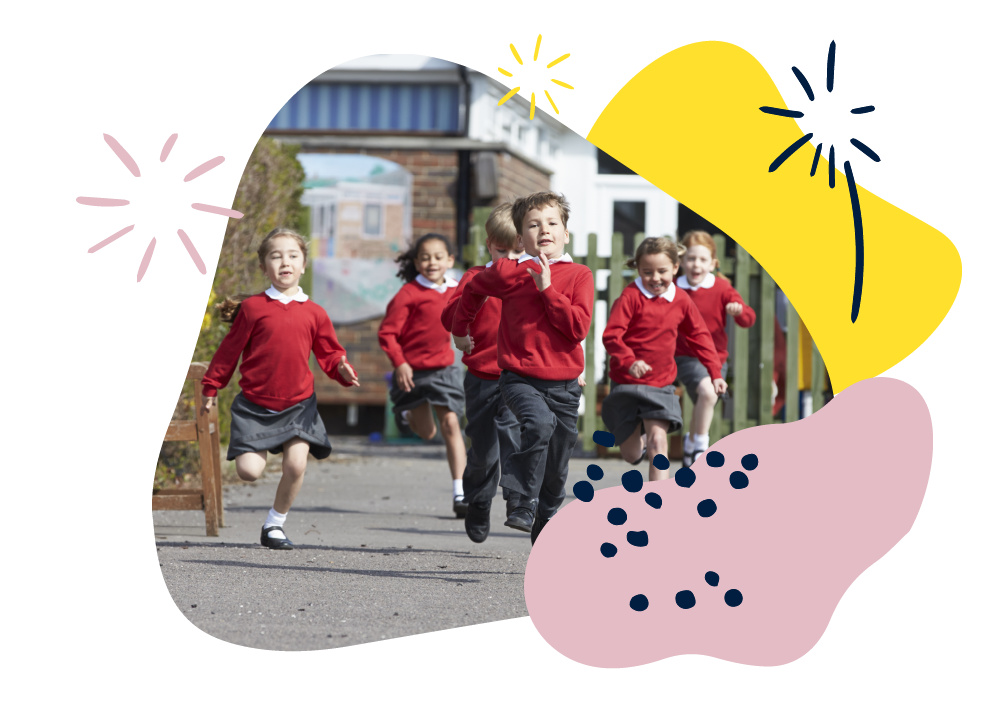Getting ready to start school
Starting primary school can be daunting for you and your child, but it marks the start of an exciting new chapter. Before you know it, your child will be making friends, learning new skills, and becoming increasingly independent.
Here are our top five tips for school readiness:
1. Support your child’s independence
The most useful thing you can do to get your child ready for school is to make sure they are comfortable doing simple tasks by themselves. This includes:
-
- Going to the toilet. Resist the temptation to pop your child onto the loo and wipe their bottom. It is better to get your child into the habit of doing this for themselves.
- Getting dressed. Avoid clothing with fiddly buckles and buttons. It is also a good idea to have a few dry runs with the PE kit!
- Putting on shoes. Tie-up shoes might be a bit difficult. Go for shoes with Velcro fasteners if possible.
- Eating. This includes using a knife and fork, opening their lunchbox, and being able to open everything in the lunchbox (some yoghurt tubes and drink cartons can be tricky).
2. Build up your child’s social skills
Learning in a classroom is a social activity. Children learn and develop by playing alongside their peers, and they will make better progress if they are happy mixing with other children and adults. You can encourage this by:
-
- Practising greetings. Your child should know how to start a conversation with their new classmates. You can use dolls and soft toys to practise saying “hello”!
- Practising conversations. Giving your child time to talk – and also having time when they have to listen – teaches vital speaking and listening skills. You could take turns to talk about the best part of your day during dinner. Can they ask questions to find out more? Can they remember their sibling’s favourite part of the day?
- Encouraging sharing and tolerance. Games such as Snakes and Ladders let children practise social skills and turn-taking. Be sure to use the language of turn-taking, like ‘Whose turn is it next?’ and ‘Thank you for waiting’. Why not arrange some play dates with your child’s new friends to put this into practice.
Video: Building kids’ resilience and confidence
How do you help build your child’s confidence and resilience? Teacher and child psychologist Jean Gross shares her tips for helping children believe in themselves.
3. Make a start on early literacy and numeracy skills
Your child is not expected to have amazing literacy or numeracy skills at this age. However, there are some ways you can get your child ready for learning:
-
- Help them recognise their name. It is handy if your child can find their space in the cloakroom, and can keep track of labelled clothes and other belongings.
- Share stories. Reading to your child improves their vocabulary and listening skills, and acting out stories is a great way to practise communication. You can find free eBooks for storytelling in our eBook library.
- Hone fine motor skills. Building hand strength, fine motor skills, and hand-eye coordination helps prepare your child for writing. Making Lego models, using scissors, and threading beads onto string are fun ways to develop hand strength.
- Introduce them to numbers. Why not go on a number hunt around your local area and take pictures of any numbers you find? You could also sing counting songs together or count objects as you set the table for dinner.
4. Help your child learn to concentrate
Being able to concentrate in 10–15 minute bursts will be really useful at school. Here are some ways to practise:
-
- Enjoy extended play together. Building kits like Lego are great for encouraging your child’s resilience, especially if they can finish the activity in one sitting.
- Follow instructions. Giving your child simple instructions to follow helps build their concentration. Why not have a go at some of these child-friendly recipes?
5. Talk to your child about school
Talking about the exciting things your child is going to do at school helps them get over any nerves. You could:
-
- Visit the school. Some schools have induction visits for children to meet their new teacher and spend time in the classroom. Walking or driving past the school at the end of the school day and watching children come out in uniform can also be very exciting!
- Talk about how fun school is! If you’ve been to a settling-in morning, there might be something your child particularly enjoyed playing with. Giving your child time to talk also lets them raise any concerns or questions. Why not take some time to read one of many books about starting school together – Our favourites are right here.
- Practise the school routine. It can be helpful to do a practice journey before the big day, looking for interesting things on the way. It might be a good idea to make sure your child has school-friendly bedtimes and getting-up times a few days in advance.
